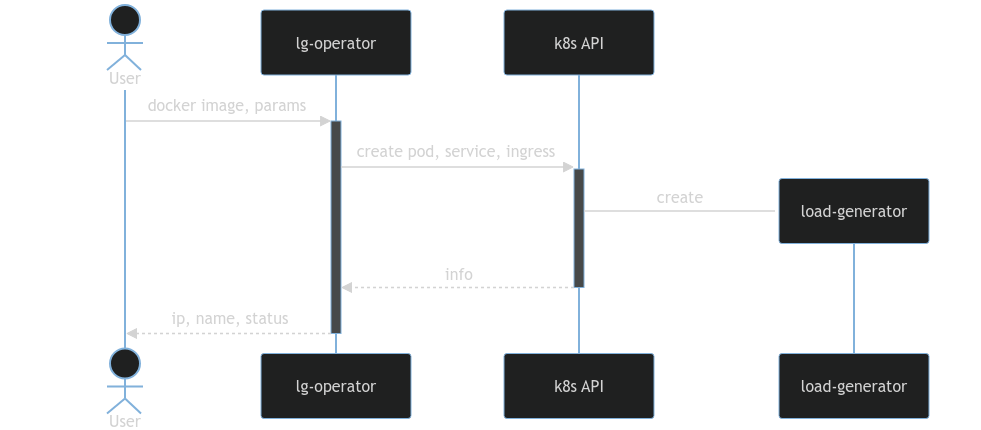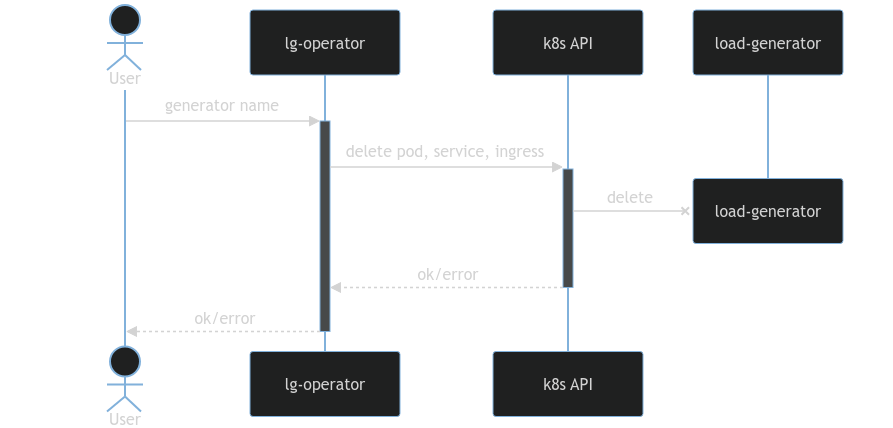Load-Generator Operator
A service designed to create and manage load generators in k8s.
Swagger documentation is available along the way pkg/lg-operator/lg-operator.swagger.json.
[[TOC]]
Minimum requirements
To use this tool, you must have at least:
- Kubernetes cluster,
- the ability to set up service account lg-operator (at least access to k8s with kubectl).
Basic commands
make install : install go dependencies,make test : run tests,make cover : display test coverage results,make run : run the service,make go-generate : regenerate mocks,make generate : update the service according to API.
Configuration setting
You can configure the startup and operation of the service in the file config.yaml.
Config structure :point_down:
service:
ports:
http: 7000
grpc: 7002
log:
level: INFO
kubernetes:
service:
host: '172.16.128.1'
port: 443
namespace: default
timeouts:
create: '2m'
delete: '30s'
generator:
port: 8888
label: load-generator
default_resources:
cpu:
request: 1
limit: 2
memory:
request: 1Gi
limit: 2Gi
cleaning:
outdated:
ttl: '24h'
enabled: true
completed:
interval: '5m'
enabled: true
Field Details:
- service section defines parameters for starting the service:
- service.ports.http : port on which the http-server will run
- service.ports.grpc : port on which the grpc-server will run
- kubernetes section determines the parameters for connecting to the kubernetes api and generator start parameters:
- kubernetes.service section determines the parameters for connecting to the kubernetes api (depend on your cluster settings):
- kubernetes.service.host - k8s API host
- kubernetes.service.port - k8s API port
- kubernetes.namespace - namespace where your load generators will run
- kubernetes.timeouts section defines timeouts for operations with generators:
- kubernetes.timeouts.create - load generator creation timeout
- kubernetes.timeouts.delete - load generator deletion timeout
- kubernetes.generator sections defines parameters for load generators deployment:
- kubernetes.generator.port - the port on which the generator will run
- kubernetes.generator.label - label to be added to all generator k8s-entities
- default_resources defines default resources for load generator if not specified in the request to create
- cleaning sets autovacuum options:
- cleaning.outdated section sets parameters for deleting old generators:
- cleaning.outdated.enabled - enable removal of old generators
- cleaning.outdated.ttl - the maximum lifetime of the generator, after which it will be deleted regardless of the status
- cleaning.completed section sets parameters for deleting completed generators:
- cleaning.completed.enabled - enable removal of completed generators
- cleaning.completed.interval - frequency of deleting completed generators.
Key features
This service will help you:
- launch load generators on a kubernetes cluster;
- remove previously launched generators;
- get a list of running generators;
- configure auto-cleanup of load generators after they complete.
You can also easily add or change the functionality of the service in accordance with your needs.
Creating load generators
You can launch a list of generators by POST /v1/generators.
The service starts pod, service and ingress for each generator.

The request must include the following information :point_down:
{
"parameters": [
{
"image": "string",
"resources": {
"memory": {
"limit": "string",
"request": "string"
},
"cpu": {
"limit": "string",
"request": "string"
}
},
"additional_envs": [
{
"name": "string",
"val": "string"
}
],
"commands": [
"string"
]
}
]
}
Field Details:
Restrictions
- The service starts load generators only in its k8s cluster.
- Generators run on a fixed port defined in config.
- Generators will not restart in case of a deployment error.
The method will return you the parameters of the launched generators or error.
Generator parameters :point_down:
{
"load_generators": [
{
"name": "string",
"cluster_ip": "string",
"external_ip": "string",
"port": 0,
"status": "string"
}
]
}
Field Details:
- name : unique name of generator pod and service;
- cluster_ip : ClusterIP of deployed load-generator service; available only within the k8s cluster;
- external_ip : ExternalIP of deployed load-generator service; accessible from outside the k8s cluster;
- port : port of generator pod and service; you can use it in http-requests with cluster_ip or external_ip;
- status : k8s status of generator pod.
You now have access to the generator within and outside the k8s cluster!
Getting a list of generators
You can find out the parameters of currently running generators (GET /v1/generators).
This method does not require input parameters.
The return value will contain the parameters of the currently running generators described above.
Deleting load generators
After the generators finished, it is recommended to remove them from the cluster (DELETE /v1/generators).
To do this, you must specify a list of generator names that you want to remove.

How to make changes
To change the service API, you need to:
- make the appropriate changes to the file
api/lg-operator/lg-operator.proto;
- install Protocol Compiler (protoc);
- install dependencies:
go install google.golang.org/protobuf/cmd/protoc-gen-go
go install github.com/grpc-ecosystem/grpc-gateway/v2/protoc-gen-grpc-gateway
go install github.com/grpc-ecosystem/grpc-gateway/v2/protoc-gen-openapiv2
go install google.golang.org/grpc/cmd/protoc-gen-go-grpc
go install github.com/grpc-ecosystem/grpc-gateway/protoc-gen-swagger
- run the following command:
make generate
 Directories
¶
Directories
¶

